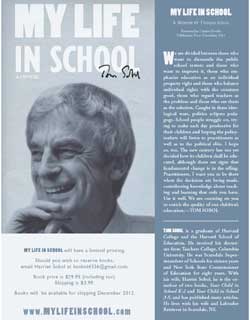First Editions: A One-Fingered Author's Tribute to Hands-On Learning
Though bed-bound, Tom Sobol celebrates Dewey's vision of life as education
By Joe Levine
The opening page of Tom Sobol's memoir, My Life In School (2012), is blank save for what appears to be an inked fingerprint. It's an appropriate symbol for an author limited to typing with one finger -- Sobol, afflicted by a spinal-cord disorder, has been bed-bound for the past three years -- but the symbolism may have broader intention.
My Life In School chronicles Sobol's nearly 80 years in education, including his eventful tenure as New York State's Commissioner of Education, when he sided with plaintiffs from New York City who sued the state for more education funding. But its real focus is on the kind of learning that disciples of John Dewey like to call "hands-on."
In prose reminiscent of Frank McCourt's Angela's Ashes, Sobol, who retired as TC's Christian A. Johnson Professor of Outstanding Practice in 2006, describes how at age 12 he cooked and cared for his two younger brothers when his mother abruptly left the family. He chronicles his path from his tough Irish Catholic neighborhood to Harvard. And, reflecting a penchant familiar to anyone who took his TC law and ethics courses, he ponders his own moral choices.
"I grew up with the language of Thomas Cranmer's Book of Common Prayer," Sobol writes. "How often I have recited in church, -'We have left undone those things which we ought to have done; and we have done those things which we ought not to have done.'"
Cranmer feels especially present in Sobol's account of how the New York State Legislature's Black and Puerto Rican Caucus protested his appointment as Commissioner. (The State's Board of Regents, as promised, had sought to hire an African American, but their chosen candidate had rejected their offer.) Saved when Governor Mario Cuomo spoke out on his behalf, Sobol ordered an investigation into education issues affecting minorities. But when, against the advice of aides, he went public with the findings, he was accused by the New York Post of issuing pronouncements that sounded "more and more as if they were written by Angela Davis." He thought about quitting, but, he writes, "Something stronger than public embarrassment wouldn't let me go."
Above all, My Life In School celebrates life's richness. There is never a sense of a man writing under the house arrest imposed by his physical infirmity or the suggestion that Sobol has ceased to learn by doing. In both education and life, he argues, "There must be time for reading what isn't assigned, for doing an experiment you thought up for yourself, for painting something the way you imagine it instead of the way it looks. There must be time for playing ball or hanging out in the school yard-'for taking bike rides to nowhere on the way home. And there certainly must be time for daydreaming-'for dealing with the central adolescent question which most of us never fully answer -- for wondering who am I."
Sobol dedicates My Life In School to his longtime associate and amanuensis, Gibran Majdalany, and to his wife: "Without Harriet, there would be no me."
To order copies of My Life In School, email Harriet Sobol at hsobol4336@gmail.com or visit Bank Street Book Store at 610 West 112th Street in Manhattan.
Published Thursday, Jun. 27, 2013
